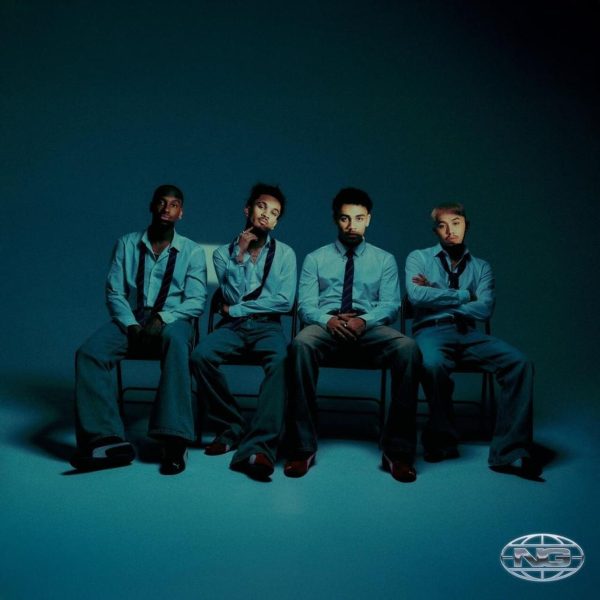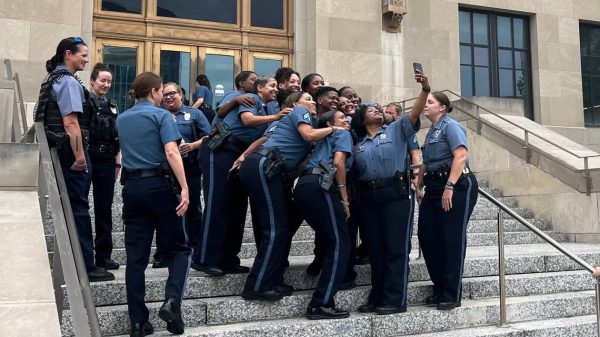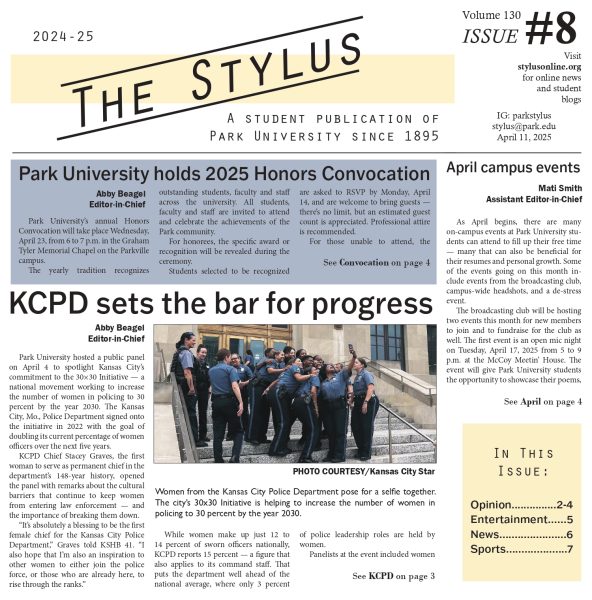Non-traditional student works for social change
She sat across the table at the downtown diner, her hands motioning with every word she spoke. Her brown hair was pulled back in a simple ponytail, brushing against the shoulders of her grey sweatshirt.
The colors in her neon running shoes stood out against her black leggings. A wedding ring glimmered on her left hand, reflecting the fluorescent light as she grasped the diamond cross hanging from a thin silver chain around her neck.
“I was a high school dropout,” she says. “But, I would rather take a chance than sit on my hands and do nothing. My passion is chasing me and I can’t get away from it.”
Gina English is a 40-year-old wife, mother and passionate advocate for social change. After receiving her GED at the age of 33, she decided to take the leap and continue her education. Currently in her senior year of the social work program at Park University, she expects to graduate in May 2015.
Today, she says, her drive and determination for social justice permeate every fiber of her being.
English quit high school at the age of 16.
“I was in a rush to be a grown up and that’s where I was in my life,” she says.
She married young, and over the course of 11 years, had four sons with her husband, the eldest now 18. English worked for her family’s company before making the decision to shift the direction of her life and go back to school.
“I realized I wanted to do more,” she says. “All of a sudden it dawned on me that I knew what being a wife was, I knew what being a mother was, but I didn’t know what being a Gina was, and one day I was going to have to figure out what it was to be a Gina.”
This was not an easy transition for her or her family. It required a lot of sacrifices from her husband and four sons. Over the years, English said she had become a “super overachiever,” frequently volunteering her time and effort at her children’s schools.
But her decision to pursue her college degree changed everything.
“We went from being a two-income family to being a one-income family,” she says, “and we have four children.”
Among the financial changes, English said she also had to learn to be okay with not being as involved with her children as she once was.
“I had to redefine what being a good mom was,” she says. “Just because I wasn’t participating in all of these things in my kid’s school didn’t mean I was failing.”
For the past three years, the social work program has offered Gina the resources, support and opportunities to develop her passion for social justice, community service and student civic engagement.
“To me, being a social worker means being an advocate,” she says. “Whether that’s an advocate for the people you work with or an advocate for the programs that you work with, I feel so strongly about being an advocate. I feel so strongly about social justice and making sure that everyone has the potential to succeed, but not everyone knows that.”
One of her research projects as a social work student focused on utilizing community service to help empower urban youth. As she delved further into her project, English began to zoom-out and see a bigger picture, which encompassed the entire Park University student body.
Reaching into a notebook sitting in the booth beside her, she pulled out a 20-page stapled stack of papers and slid them across the diner table. It was titled “Evolving a Global Environment,” and was addressed to Michael H. Droge, the now former president and current Chancellor of Park University.
Under her name on the title page, a scribbled message in blue ink, work done by a previous professor, reads “Very impressive. Let’s make this happen.”
“None of this has been for a grade,” she says. “It’s just my passion and I can’t let go of it.”
The proposal, which she sent out to interested Park faculty members as well as Kansas City Mayor Sly James, includes a solution to a need English views as an urgent issue in the community. She proposes the idea of utilizing college students and their skills, according to their specific majors, to meet the pressing needs in the community.
For her practicum, English is working with the Housing Authority of Kansas City, which she says has limited resources and lives in extreme poverty.
“I think to myself, how amazing is it that we have this wealth of manpower and resources?” she says. “We could be the ones coming in and offering those resources. Social work students could help with parenting classes, and education students could be helping with tutoring.”
As the resource officer of Park’s social work club, she explains her ultimate goal is to develop a program connecting students who are interested in being involved in the community to areas of need and outreach opportunities. She says this can open countless doors for students career-wise as they network with professionals in their specific fields, and begin to get hands-on experience outside of the classroom.
Apart from her studies, English is also a leader in an intense weight loss boot camp for women, each session lasting 12 full weeks. This is where she says she goes to refuel, burn stress, and ultimately, become inspired by the women and their determination to make a change in their lives.
She is also a member of the Latina Giving Circle, a philanthropist group partnered with The Women’s Foundation of Greater Kansas City, which helps raise money to fund grants specifically geared towards empowering Latinas.
“I realize that I hold a certain responsibility to be a role model,” she says. “This gives me a stronger connection to my cultural roots and ethnicity.”
English says that her educational journey has sparked an incredible change in nearly every area of her life. She says the greatest accomplishment she has received from going back to school is the ability to see her own potential, accepting it and being proud of it.
“It was a huge transition spiritually, mentally and emotionally,” she says. “When you go from being a high school dropout, you keep yourself safe under this umbrella of not really trying. It was very hard for me and I was very intimidated at the idea of actually trying. I remember my first day of class, thinking, ‘Do I really belong here?’ I didn’t have that security yet and that confidence in myself, which has really built and grown over my educational journey.”
Your donation will support the student journalists of Park University. Your contribution will allow us to cover our annual website hosting costs, freeing up other funds for equipment, printing and training.







